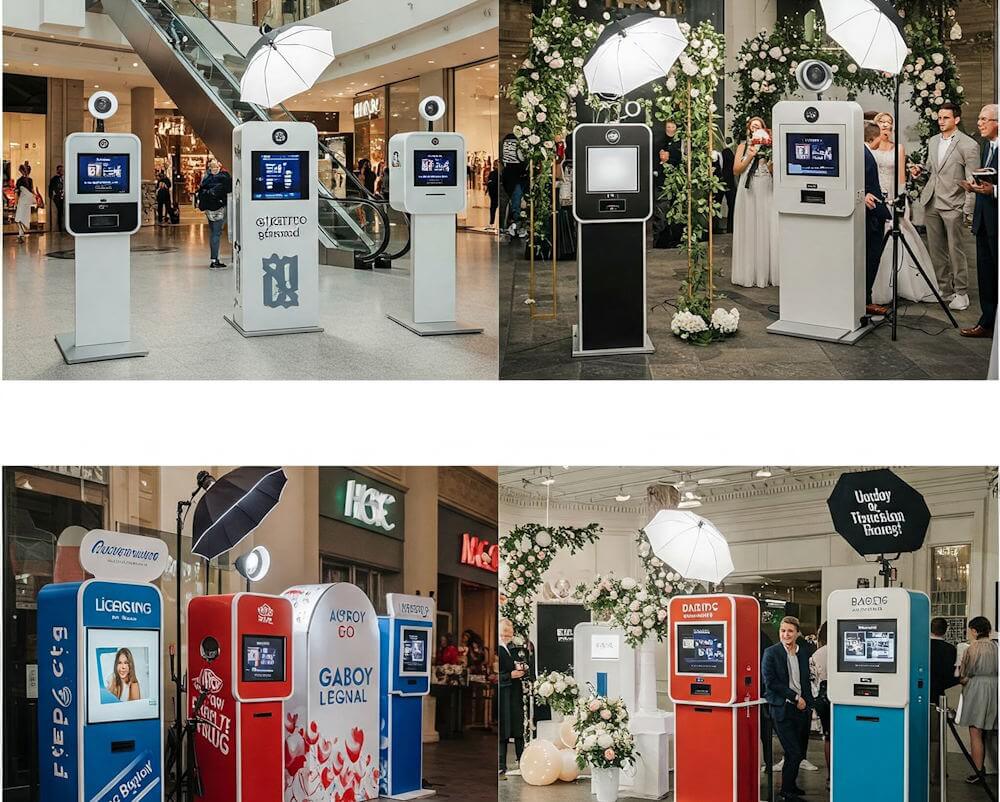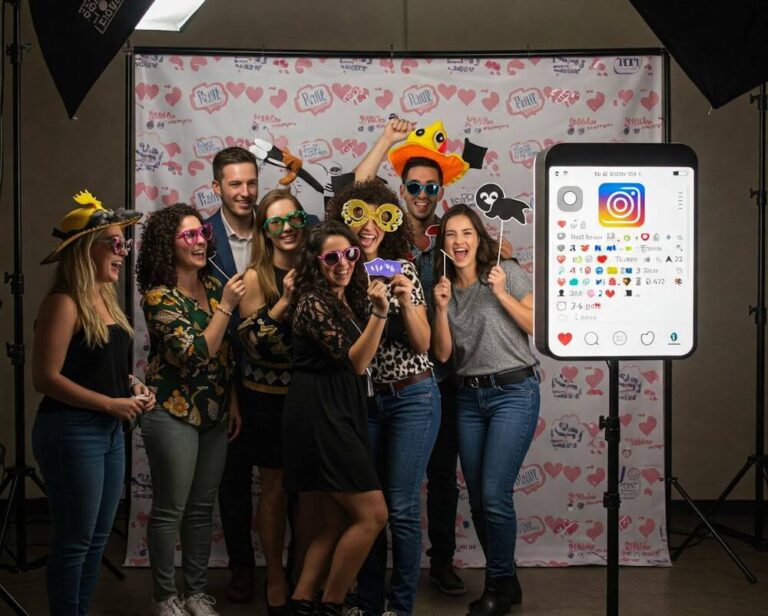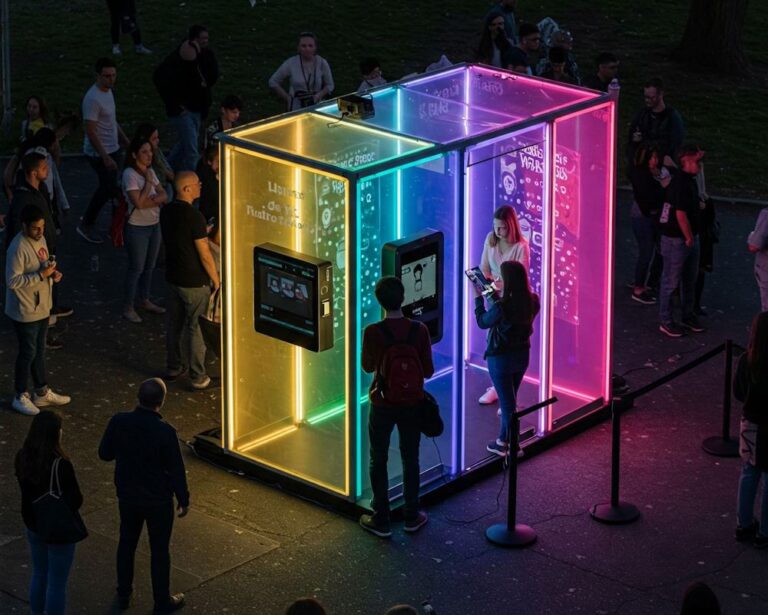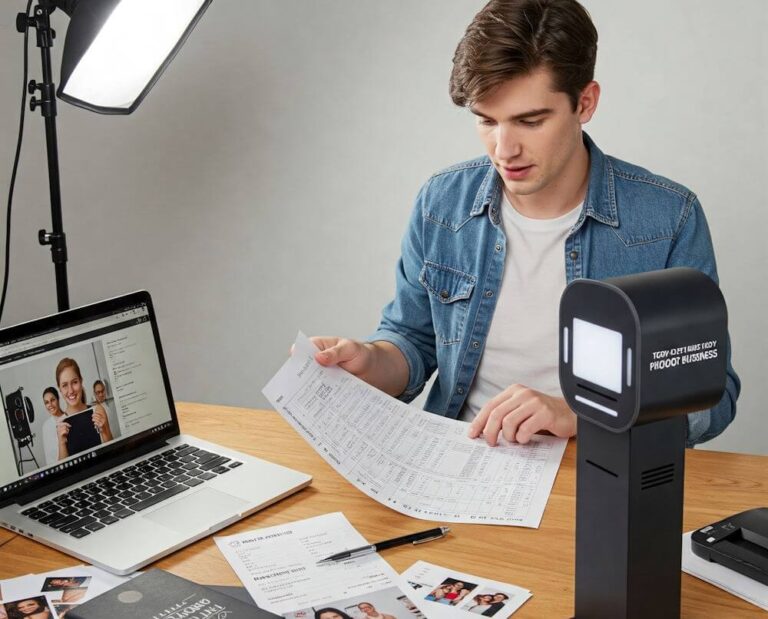Introduction to Photo Booth Business Models
The photo booth business has gained substantial traction in recent years, positioning itself as a popular choice for various events such as weddings, corporate gatherings, and parties. This thriving market is fueled by a growing demand for innovative entertainment and unique experiences, allowing brand owners to capture invaluable memories for their clients. As this industry continues to flourish, aspiring entrepreneurs eager to dive into the photo booth business must decide on an effective business model that aligns with their goals and vision. Two prominent options available are licensing and franchising.
Licensing involves granting permission to another entity to use your brand name, trademark, or business model in exchange for a fee or royalty. This model allows for considerable flexibility, as licensees operate independently while utilizing the established brand’s framework. On the other hand, franchising requires a more structured system, where the franchisor provides a comprehensive business model, operational guidance, and ongoing support to the franchisee. In return, the franchisee pays an initial investment and ongoing royalties. This offers a more cohesive strategy in terms of branding and customer experience.
Understanding the differences between these two business models is crucial for new entrepreneurs who seek to expand their photo booth brands successfully. Both strategies offer distinct advantages and drawbacks, making it imperative for business owners to conduct thorough research and assess their own objectives before making a choice. By determining the most suitable approach, entrepreneurs can better position themselves in the competitive landscape of the photo booth industry and maximize potential growth and profitability.
Understanding Licensing in the Photo Booth Industry
Licensing is a strategic business practice that enables companies to grant permissions to other parties for the use of their intellectual property, brand name, or proprietary technology. In the context of the photo booth industry, licensing can serve as a powerful tool for expansion while maintaining brand integrity. Essentially, when a photo booth brand adopts a licensing model, it allows other businesses to operate under its established trademark and utilize its professional services, often in exchange for a fee or a percentage of revenue generated.
One of the primary benefits of licensing is the ability to maintain brand control while leveraging the resources and market presence of licensees. Through a well-structured licensing agreement, a photo booth company can ensure that its standards, quality, and customer service protocols are upheld across all licensed operations. This framework not only preserves the brand’s reputation but also promotes uniformity in service delivery, which is crucial for brand recognition and customer trust.
However, there are inherent limitations to licensing that should be considered. Primarily, while the licensee can operate under the brand, the original company often relinquishes a degree of control over day-to-day operations. This can lead to variations in the customer experience if the licensees do not adhere to the stipulated guidelines. Furthermore, the revenue potential from licensing can be less predictable than direct ownership, as the financial success of the brand largely depends on the performance of its licensees.
In terms of responsibilities, both parties must navigate the obligations outlined in the licensing agreement. The licensor, typically the photo booth brand owner, is responsible for providing comprehensive training, marketing support, and resources to ensure the licensee’s success. Conversely, the licensee must adhere to the guidelines provided, contribute to brand promotion, and maintain the operational standards expected by the licensor. This mutual dependency underscores the importance of clear communication and alignment between the two parties to foster a successful licensing relationship within the photo booth industry.
The Franchising Model for Photo Booth Brands
Franchising is a business model in which a franchisor permits an independent entrepreneur, known as a franchisee, to operate a business under the franchisor’s established brand and system. This arrangement is particularly prominent in the photo booth sector, where enthusiastic individuals seek to capitalize on the growing demand for entertainment and event services. By entering a franchise agreement, photo booth brands can leverage the existing reputation and operational framework of a recognized brand, thereby increasing their chances of success in the competitive marketplace.
The franchising model offers several advantages that can significantly benefit aspiring photo booth owners. One of the most notable is the benefit of brand recognition. When franchisees join an established photo booth brand, they gain instant credibility and visibility, drawing on the franchisor’s existing customer base and marketing efforts. This recognition can lead to faster customer acquisition and increased bookings at events, a crucial factor in the often seasonally driven photo booth industry.
Another advantage of franchising is the extensive support provided by the franchisor. Franchisees typically receive comprehensive training in the operational and marketing facets of running a photo booth business, as well as ongoing assistance in areas such as customer service, equipment maintenance, and technological advances. This structured approach can significantly reduce the learning curve for new business owners, enabling them to focus on securing events and enhancing customer experiences.
Despite these benefits, it is essential to consider the challenges and costs inherent in franchising. Franchise agreements often entail significant upfront fees and ongoing royalty payments, which can pressure new owners financially. Additionally, franchisees may face restrictions on how they operate their business, limiting creativity and independence. Therefore, while franchising provides a well-trodden path to success for photo booth brands, it is crucial for potential franchisees to weigh both the advantages and challenges comprehensively before making a commitment.
Key Differences Between Licensing and Franchising
When it comes to expanding a photo booth brand, two common avenues are licensing and franchising. While these business models may seem similar, several critical differences set them apart, particularly in control, brand usage, training, fees, and operational independence.
First, control remains a significant distinction between the two models. In franchising, the franchisor maintains considerable control over the franchisee’s operations, which includes adherence to specific business practices, marketing strategies, and service provisions. This level of control ensures that the brand’s image and consistency are upheld across all franchise locations. In contrast, licensing offers more operational autonomy to the licensee. Here, the licensee has the freedom to operate with minimal oversight, using the brand’s intellectual property as they see fit while still maintaining compliance with basic contractual obligations.
Brand usage is another area where licensing and franchising diverge. With franchising, franchisees are obliged to use the franchisor’s established brand elements, including logos, trademarks, and marketing materials, thereby creating a unified brand image. Licensing, on the other hand, permits licensees to use the brand in a more flexible manner, allowing them to adapt elements to suit regional markets or personal preferences.
The training requirements also vary significantly. Franchisors frequently provide comprehensive training programs that cover various aspects of running the business, equipping franchisees with specialized knowledge. In contrast, training provided in licensing agreements is usually less extensive, leading to varying levels of expertise among licensees.
Lastly, financial considerations such as fees differ between the two models. Franchisees typically pay an initial franchise fee along with ongoing royalties linked to sales, indicating a continuous financial commitment to the franchisor. Licensees, in comparison, usually incur a one-time licensing fee with fewer recurring costs, offering greater financial flexibility.
Assessing Your Business Goals: Which Model Suits You?
When considering the future of your photo booth brand, assessing your business goals is crucial in deciding between licensing and franchising. Each model offers unique advantages and challenges that can significantly impact your venture’s trajectory. The first step in this evaluation is to define your aspirations clearly. Do you envision rapid expansion across multiple locations, or are you more inclined toward establishing a focused brand presence? Franchising, with its inherent capacity for scaling, may appeal to those looking to broaden their market reach swiftly. In contrast, licensing could be more suitable for brands aiming for a controlled growth trajectory.
Another important factor to consider is your risk tolerance. Franchising often requires a more substantial investment in terms of both time and financial resources. Franchisees may expect comprehensive support, leading to a greater commitment on the part of the franchisor. If a more hands-off approach aligns with your risk appetite, licensing might be the better choice, as it typically allows you to generate revenue with less direct involvement in day-to-day operations.
Market conditions also play a significant role in this decision-making process. Analyzing your target demographic, competition, and potential market saturation can help inform whether licensing or franchising aligns best with your business strategy. Financial resources are equally critical; while franchising may require substantial upfront capital for training and support systems, licensing could present a lower barrier to entry.
Ultimately, determining the model that best aligns with your ambitions is all about understanding your business’s unique characteristics. By carefully weighing your goals, risk tolerance, market conditions, and financial resources, you can make an informed decision that positions your photo booth brand for success.
Legal Considerations: Contracts and Compliance
When determining the appropriate model for your photo booth brand, understanding the legal implications of licensing and franchising is essential. Both models involve different contractual obligations and regulatory considerations that can significantly impact your business operations.
In franchising, a franchise agreement is critical. This legally binding document defines the relationship between the franchisor and franchisee, outlining essential aspects such as fees, rights, and responsibilities. Franchisors must ensure their agreements comply with the Federal Trade Commission (FTC) regulations, as well as state laws that may impose additional disclosure requirements. It is crucial for franchisors to provide potential franchisees with a Franchise Disclosure Document (FDD) that outlines all necessary details about the business model, fees, and obligations, enabling informed decisions.
Alternatively, in a licensing agreement, the licensor grants permission to the licensee to use certain intellectual property, such as brand names, photos, or proprietary software, without transferring ownership. This model requires a well-structured licensing agreement that delineates how the licensed materials can be used. It’s pivotal for licensors to clearly specify the terms of use, payment structures, and duration of the agreement to protect their proprietary assets. Compliance with copyright laws and potential trademark infringements should also be taken into account to safeguard one’s brand.
Both licensing and franchising necessitate thorough legal reviews and compliance with local laws and regulations. Factors such as zoning laws, business registration, and health and safety regulations could affect both types of agreements. It is advisable for business owners to consult with legal professionals specializing in franchise and licensing law to ensure all contracts are comprehensive and compliant with applicable jurisdictions.
Marketing Strategies for Licensed vs. Franchise Models
When establishing a photo booth brand, the choice between licensing and franchising significantly influences marketing strategies. Each model offers distinct avenues for promoting the business, presenting unique opportunities and challenges in terms of brand control, funding, and audience engagement.
In a licensing model, the licensee operates under the established brand while maintaining a degree of independence. This flexibility allows for tailored marketing approaches that resonate specifically with local audiences. Licensees have the liberty to design their promotional strategies, which may include localized social media campaigns, participation in community events, and targeted advertising. However, without strict brand guidelines, maintaining consistency across the brand can be challenging. Regular communication with the licensing entity is paramount to ensure that marketing campaigns align with brand identity and values.
Conversely, the franchise model offers a more structured approach to marketing. Franchisees benefit from a centralized marketing strategy, often supported by a pool of funds contributed by all franchisees. This collective approach can lead to more substantial marketing campaigns, including national advertising, comprehensive digital marketing initiatives, and branded merchandise. Franchisees are usually required to adhere to specific branding and promotional standards, ensuring a consistent brand image that can enhance recognition across diverse markets.
To enhance marketing effectiveness in both models, it is crucial to focus on audience engagement. Utilizing analytics tools can provide insights into target demographics, enabling tailored campaigns that resonate more profoundly. Additionally, blending traditional advertising with modern digital strategies, such as influencer collaborations and interactive social media content, can further engage potential customers.
Ultimately, whether adopting a licensing or franchising model, understanding the unique marketing implications of each can significantly influence the growth and visibility of a photo booth brand in a competitive marketplace.
Success Stories: Brands that Chose Licensing or Franchising
The photo booth industry has seen various brands flourish by adopting either licensing or franchising as a strategic approach for expansion. One notable example is Snap Space, a photo booth brand that embraced the franchising model. Starting with a single location, Snap Space experienced significant growth by allowing franchisees to operate under its established brand. The company provided comprehensive training and ongoing support to franchise owners, which led to consistent brand quality across locations. Overcoming initial hurdles, such as finding the right franchisees and maintaining operational standards, Snap Space successfully scaled its operations to over 50 locations nationwide. This journey illustrates how a solid franchise framework can facilitate rapid expansion and brand recognition in the competitive photo booth market.
In contrast, Picture Perfect opted for a licensing strategy, where they allowed other entrepreneurs to use their trademark and business model without the stricter controls associated with franchising. This flexibility attracted a diverse range of partners who appreciated the independence to tailor their offerings while leveraging Picture Perfect’s established reputation. The brand faced challenges in maintaining quality and brand integrity without extensive oversight, but they countered these issues by implementing a robust licensing agreement that outlined expectations and quality standards. Their innovative approach resulted in a network of over 30 licensed operators, all of whom benefited from collaborative marketing strategies and shared resources, contributing to collective growth.
These success stories highlight the versatility of both licensing and franchising in growing a photo booth brand. Whether choosing to franchise for tighter control and training or licensing for more flexibility and independence, each model presents unique opportunities and challenges. The experiences of Snap Space and Picture Perfect exemplify how carefully considered choices in business strategy can lead to prosperity within the dynamic landscape of the photo booth industry.
Final Thoughts: Making the Right Choice for Your Brand
When contemplating the expansion of a photo booth business, the critical choice between licensing and franchising cannot be underestimated. Both paths offer unique advantages and challenges that must align with the brand’s vision, operational capabilities, and market conditions. Licensing, as a strategy, allows for greater flexibility and autonomy, granting licensees the ability to operate under the brand’s name without extensive oversight. This can be beneficial for those who prefer to maintain control over their business operations while still benefiting from a recognized brand. However, it often lacks the uniform support and marketing power that franchising typically provides.
On the other hand, franchising offers a structured business model with a comprehensive support system, which can be crucial for newer entrepreneurs or those looking to scale quickly. Franchisees receive training, marketing materials, and operational guidelines that can foster quicker success. Nevertheless, this comes with a higher level of commitment and potential fees that must be factored into the overall business strategy.
Ultimately, the decision between licensing and franchising should emerge from thorough market research, a clear understanding of personal business goals, and the desired level of involvement in day-to-day operations. Each brand’s unique circumstances will influence which model is more suitable. It is advisable for aspiring business owners to consult with industry professionals who can provide tailored insights and guidance through this decision-making process. By evaluating both options carefully and considering professional advice, you will be better equipped to choose the pathway that aligns not only with your brand’s values but also with your ambition for growth and sustainability in the competitive photo booth industry.







